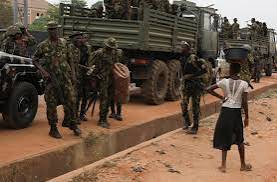Election Day Chaos in Waja, Ghana: Soldiers Open Fire Amid Tensions Between NPP and NDC.
Waja, a usually peaceful town in Ghana, witnessed chaos today as tensions escalated between supporters of the ruling New Patriotic Party (NPP) and the opposition National Democratic Congress (NDC) during the 2024 general elections. The clashes, which erupted over allegations of electoral malpractice, resulted in a series of violent incidents, including soldiers firing on a car in what authorities described as an attempt to restore order.
This year’s elections have been marked by intense rivalry between the NPP and NDC, with both parties accusing each other of foul play. The events in Waja highlight the deep divisions and high stakes of this electoral season, as both parties vie for control in what is anticipated to be one of Ghana's most hotly contested elections in recent years.
The Incident
Eyewitness accounts indicate that the unrest in Waja began early in the day when supporters from both camps accused each other of voter intimidation and ballot stuffing at a polling station. What initially started as verbal altercations quickly escalated into physical confrontations, prompting the intervention of security forces.
In the heat of the chaos, soldiers stationed in the area reportedly fired at a car suspected of carrying weapons or ballot boxes, further inflaming tensions. While no fatalities were reported, the incident caused panic among voters and polling officials, leading to the temporary suspension of voting in the affected area. The driver of the car, whose identity remains unknown, was taken into custody for questioning.
The Ghana Armed Forces issued a statement defending the soldiers’ actions, stating that they acted in accordance with their mandate to ensure law and order. "Our personnel responded to intelligence suggesting potential threats to the election process. The firing was a measured response to a perceived danger," the statement read. However, some residents have criticized the military's heavy-handed approach, calling it an overreach that could deter voter participation.
Political Reactions
The NPP and NDC have traded blame for the unrest, each accusing the other of orchestrating the violence. The NPP's parliamentary candidate for the area, Kwame Asante, condemned the clashes, describing them as "a deliberate attempt by the opposition to derail the democratic process." He urged his supporters to remain calm and assured them that the party would continue to monitor the situation closely.
On the other hand, the NDC's candidate, Ama Kusiwaa, accused the ruling party of deploying security forces to intimidate voters and suppress turnout in NDC strongholds. "What happened in Waja is a direct assault on our democracy. The government must be held accountable for using state machinery to undermine free and fair elections," she said during a press briefing.
Voter Sentiment
The violence has left many residents of Waja disillusioned and fearful. Several voters who had queued early to cast their ballots left without voting, citing concerns for their safety.
"I came here to exercise my democratic right, but now I fear for my life," said Adwoa Mensah, a teacher who witnessed the clashes. "This is not the Ghana we know. Elections should not be a matter of life and death."
Others expressed frustration at the delays caused by the disturbances. "We waited in line for hours only for the voting to stop. If this continues, how can we trust the results?" lamented Kojo Appiah, a farmer.
The Broader Context
Ghana, often hailed as a beacon of democracy in West Africa, has seen its political landscape grow increasingly contentious in recent years. While past elections have generally been peaceful, occasional outbreaks of violence have raised concerns about the sustainability of the country's democratic gains.
The 2024 elections are seen as a critical test for the Electoral Commission of Ghana, which has faced mounting pressure to ensure transparency and credibility amid accusations of bias from both major parties. International observers have also called for calm, urging political leaders to prioritize dialogue and peaceful resolution of disputes.
What Lies Ahead
As Waja grapples with the aftermath of today's events, the focus now shifts to how the Electoral Commission and security agencies will address the fallout. With tensions running high across the country, many fear that similar incidents could erupt in other regions before the conclusion of the electoral process.
The government has pledged to investigate the Waja incident thoroughly, vowing to hold accountable anyone found guilty of inciting or perpetrating violence. Meanwhile, civil society groups have called on political leaders to refrain from inflammatory rhetoric that could further divide the nation.
As Ghanaians await the final results, the events in Waja serve as a stark reminder of the fragility of democracy and the need for collective efforts to safeguard peace and stability in the electoral process.




No comments yet
Be the first to share your thoughts!